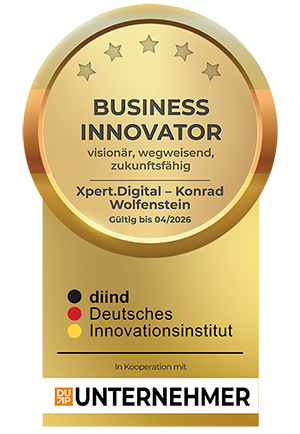How do you achieve innovation: by failing quickly – paradox?
Published on: April 13, 2024 / Update from: April 13, 2024 - Author: Konrad Wolfenstein
🌱💡 Innovation is the driving force
🏆 Innovation is the driving force that enables companies and societies to develop, improve and thrive. It enables you to encounter new challenges and needs through creative and effective solutions. But how do you achieve innovation in a world that is constantly and rapidly changing?
A frequently promoted method in the world of start-ups and agile companies is the concept of “Fail Fast” or “Fail Fast”. At first glance, this may seem like a paradox, as failure is usually viewed as something negative that should be avoided. In fact, this acceptance of failure as part of the innovation process is a key to success.
“Fail fast” does not mean intentionally setting yourself up for failure, but rather creating an environment where experimentation, prototyping, and iterative development encourage testing new ideas quickly and cost-effectively. This approach allows failures to be identified early and learned from, which in turn can lead to faster and more efficient innovation.
🔄🔍 Can failure actually be positive?
Yes, because failure is often an unavoidable phenomenon that accompanies any innovation process. The central thesis behind the concept of failing fast is that through failure, valuable insights can be gained that not only help avoid mistakes in the future, but also have the potential to lead to groundbreaking new approaches.
The way we interpret failure has changed over the years. In the traditional business world, failure was often stigmatized – it was a sign of incompetence or poor planning. Today, however, more and more innovators and entrepreneurs are recognizing that the courage to explore new, untested paths and to recognize the inevitability of occasional failure are among the most important qualities that define someone with an innovative spirit.
🌀 🗂️ Agile development and the principle of failing quickly
In software development and many other sectors, the principle of agile management has helped cultivate the idea of failing fast. Agile methods focus on adaptability, cross-functional teams and the incremental delivery of product features. Short development cycles, so-called “sprints”, are used to quickly receive feedback and improve the product or service.
By making small but continuous improvements, you reduce the risk of major failures and enable evolutionary development that is more responsive to change and unexpected obstacles.
🧠🛡️ Learning culture and psychological safety
In order to make failing quickly an effective tool, a corporate culture is required that promotes learning and personal development. This also includes creating an environment of psychological safety in which employees dare to take risks without fear of negative consequences if they fail.
Such a culture encourages learning from mistakes and using them as opportunities for improvement rather than punishing them. Companies that cultivate such a learning culture not only report increased innovative strength, but also increased employee satisfaction and retention.
🖊️🌐 Design thinking as an innovation approach
Design thinking is another approach that embraces the philosophy of failing fast. This approach is based on an iterative process that combines empathy for users, creativity in idea generation and rationality in implementation. Through prototyping and regular user testing, ideas are quickly validated or rejected, making efficient use of time and resources.
🏢🚀 Examples from practice
Some of the world's most successful companies have integrated the principle of failing fast into their innovation processes. Google, for example, allows its employees to spend 20% of their working time working on projects that are outside of their main activities. Many of these projects fail, but some lead to successful products like Gmail or Google News.
Another example is Amazon, whose CEO, Jeff Bezos, has described failure as essential to success. He emphasizes that in order to achieve great success, one must be prepared to take proportional risks and sometimes fail. Many of Amazon's innovations, such as the Amazon Kindle, would not have been created without this mentality.
🚧🗣️ Resistance and challenges of failing quickly
Despite the many advantages, the concept also faces resistance. A common criticism is that failure is a hard sell in a culture that is hostile to failure. It requires a change in mindset at all levels of an organization.
Another challenge is dealing with investments and the use of resources. Particularly in larger, established companies, there could be a fear that too free an interpretation of rapid failure will lead to financial abuse or unwise decisions.
⚙️📈 Concept of failing quickly
The concept of failing fast provides a strong foundation for the successful innovation process in a dynamic and competitive environment. This concept enables companies to quickly test and further develop prototypes and ideas and to learn valuable lessons from mistakes. It is important to create a corporate culture that sees and supports mistakes as an essential part of the learning and innovation process.
📣 Similar topics
- 🚀 Learning from mistakes: Innovation through rapid failure
- 🌐 The Evolution of Failure: A New Approach in Dynamic Times
- 🎢 Agile development: The principle of failing quickly in focus
- 🤝 Learning culture and psychological safety in everyday company life
- 💡 Design Thinking: Iterative innovation through fast feedback loops
- 📊 Practical examples: How Google and Amazon benefit from failing quickly
- 🚫 Resistance to failing quickly: Challenges in companies
- 🔧 Taking risks: The role of failure in the innovation process
- 💼 Corporate culture: See mistakes as an opportunity
- 👥 Psychological safety: cornerstone for innovation and creativity
#️⃣ Hashtags: #Innovation #FailFast #AgileDevelopment #LearningCulture #DesignThinking
📈💡 Try it out: The Triosmarket is an innovative marketing strategy
Introduce experimental marketing with the Triosmarket model and drive innovation through try & error!
A successful example of the potential of this approach is Google, which developed from a simple search engine into one of the most powerful companies in the digital world. In the early days of the Internet, for many this medium was just a short-lived trend, a hype that would soon pass. But through constant experimentation, testing and adaptation, pioneers like Google have cemented the Internet as an essential part of our everyday lives.
More about it here:

🎯🎯🎯 Benefit from Xpert.Digital's extensive, fivefold expertise in a comprehensive service package | R&D, XR, PR & SEM

AI & XR 3D Rendering Machine: Fivefold expertise from Xpert.Digital in a comprehensive service package, R&D XR, PR & SEM - Image: Xpert.Digital
Xpert.Digital has in-depth knowledge of various industries. This allows us to develop tailor-made strategies that are tailored precisely to the requirements and challenges of your specific market segment. By continually analyzing market trends and following industry developments, we can act with foresight and offer innovative solutions. Through the combination of experience and knowledge, we generate added value and give our customers a decisive competitive advantage.
More about it here:
We are there for you - advice - planning - implementation - project management
☑️ SME support in strategy, consulting, planning and implementation
☑️ Creation or realignment of the digital strategy and digitalization
☑️ Expansion and optimization of international sales processes
☑️ Global & Digital B2B trading platforms
☑️ Pioneer Business Development
I would be happy to serve as your personal advisor.
You can contact me by filling out the contact form below or simply call me on +49 89 89 674 804 (Munich) .
I'm looking forward to our joint project.
Xpert.Digital - Konrad Wolfenstein
Xpert.Digital is a hub for industry with a focus on digitalization, mechanical engineering, logistics/intralogistics and photovoltaics.
With our 360° business development solution, we support well-known companies from new business to after sales.
Market intelligence, smarketing, marketing automation, content development, PR, mail campaigns, personalized social media and lead nurturing are part of our digital tools.
You can find out more at: www.xpert.digital - www.xpert.solar - www.xpert.plus


























